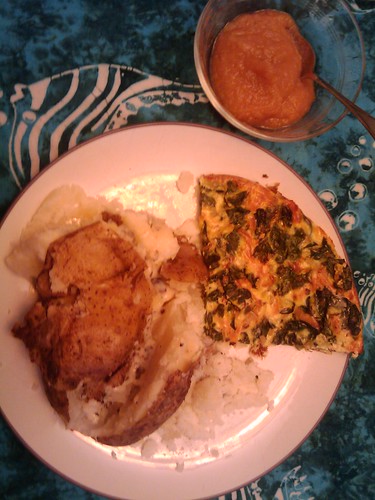Eating made from scratch meals is common in our house. Most days we eat 3 meals of homemade food, mostly made from scratch. Many people we meet are stunned that we do this. 100 years ago everyone ate from home, but now many people are used to lunch out, and often breakfast and dinner on the run.
Yet research from dietitians and psychologists alike confirm that eating at home, and eating made from scratch food is healthier for our bodies and familial relationships.
So, how do you do it?
1) Make the commitment. There are lots of reasons you might make homemade foods a priority. We enjoy the food more than premade, like the culinary adventure, and feel closer as a family when we eat homemade foods.
2) Join a CSA, co-op, or herdshare. This winter we have a weekly veggie CSA from Athens Hills, weekly milk /egg share from a farmer friend, a monthly meat CSA from 2Silos Farm, and monthly dry goods co-op from Frontier. We've already paid for these items at the beginning of the season. The pickups are closeby. We can't stand to waste food, so once the groceries are in the house, we feel obligated to use them.
3) Plan. Some people are meal planners who have a rotation of 21 dinners, or do a month in advance. We are not such people. We do try to write on a whiteboard on the fridge weekly our dinner plans. That way we at least know how we will use most of the CSA foods and what we need to prep ahead.
4) Reduce trips to the grocery store. When you have the right mix of planning and CSA/co-ops, grocery store trips become less needed, and the temptation to buy premade is reduced.
5) Take baby steps. Slowly eliminate some of the processed food you eat and replace it with homemade. You might start by baking bread once a week. Or take a weekend day and make a big batch of jam, canning or freezing some for later. Make double batches of soup, spice rubs, waffles, etc. and freeze or save the half you don't use for a quick meal later. Much of the homemade food we eat is canned or frozen by us when we have time. We all have things to work on: boxed crackers, corn chips, and cereal are still staples here, as is store bought kefir, cheese, and wine.
6) Lower your expectations. Restaurant eating normalizes the experience of eating a meal with 4 or 5 components, often each with their own sauce. Very often our homemade meals are much simpler. Breakfast is yogurt and granola, oatmeal, or toast. Lunch is usually packed for on the go eating: a simple protein (cheese, slice of meat, boiled egg), salad or veggie sticks, whole piece of fruit, and starch (chips, crackers, bread). Dinner is protein (meat, beans, or meat substitute), starch (potato, rice, muffin), and veggie. Here is a picture of tonight's dinner -fritatta with swiss chard, baked potato with leftover mushroom sauce from last night, and applesauce canned in the fall.

7) Enjoy the benefits! If you make food from scratch more often, you might find yourself with a new friend in your CSA provider. You will gain confidence in your cooking ability and your family will become closer. You might even feel healthier.
What do you do to Eat Homemade?
